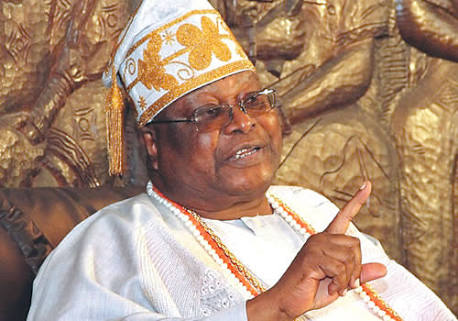Based on the comments of the Alake of Egba Land, Adedoyin Gbadebo, on the hierarchy of traditional rulers in Yoruba land, the Awujale of Ijebuland, has replied his royal counterpart asking him to get his facts right.
The Awujale considered it an error and reaching too far of the Alake to have placed himself above him in the order, adding the act pointed how shallow his knowledge of Yoruba Traditional system is.
The traditional ruler made the clarification at the launch of the endowment fund of Oba Sikiru Kayode Adetona Professional Chair in Governance at the Department of Political Science, Olabisi Onabanjo University, Ago-Iwoye, Ogun State.
The Awujale of Ijebuland said; “The Alake, while receiving the Ooni at his palace said that Yoruba Obas (the Big Five so to say) had been categorised with the Ooni in the first position followed by the Alaafin, the Oba of Benin, with the Alake coming fourth and the Awujale as the fifth in that order,”
“He also went further to quote wrongly from a 1903 Gazette to support all the fallacies in his statement.”
“Therefore, I consider it necessary to debunk the aforementioned falsehood and misrepresentation of facts from Ake’s palace so as to put the records straight,
“First, I would like to make it abundantly clear that the 1903 Gazette referred to by Alake was just a newspaper publication that he, in his self-serving role is now presenting as an official Government Gazette’.
“The first question to Alake is: who categorised the Yoruba Obas and when? I challenge him to produce the document of the said categorisation.
“It is a known fact that Alake was a junior traditional ruler under the Alaafin at Orile Egba before he fled to Ibadan for refuge as a result of the war then ravaging in Yorubaland.
“Following the defeat of Owu by the Ijebu Army in 1826, the Owus became refugees all over Yorubaland. Some of the Ijebu troops that fought the war proceeded to Ibadan where they met Alake and sacked him, consequently forcing him to seek refuge at Ake in Abeokuta in 1830 where of course, he met the Osile, Olowu, and Agura already settled at Oke-Ona, Owu and Gbagura sections of Abeokuta Township respectively.
“Even then, the Olubara, of Oyo origin had always argued that all the aforementioned four rulers met him in Abeokuta and therefore claimed to be their landlord. To even refer to Alake as “Alake of Abeokuta” not to talk of Egbaland, is a misnomer, as his control since his arrival at Ake in 1830 and till today is restricted to Ake section of Abeokuta. The official Government Gazette testifies to this fact.
“In short, the Alake from history and all available records is a very junior traditional ruler in Yorubaland. His peers in Ijebuland are the Dagburewe of Idowa, Ajalorun of Ijebu-Ife, Akija of Ikija–Ijebu, Olowu of Owu-Ijebu, Oloko of Ijebu-Imushin, Orimolusi of Ijebu-Igbo and Ebumawe of Ago-Iwoye.”
Oba Adetona added that; “It is important for Alake’s education to appreciate that Ijebu has been in existence for almost 1,000 years and that we are the only people that still remain in our original homestead while other Yoruba towns and villages have relocated twice or more,”
“If only he (Alake of Egbaland) cares to obtain a copy of the Book: ‘The Ijebu of Yorubaland 1850-1950’ by the late Prof. E. A. Ayandele, that erudite Professor of History and endeavour to read it, there, he will know who the Ijebus are and appreciate that from time immemorial and since our settlement on Ijebu soil, Ijebu was indeed a nation until 1892 when we were defeated in the Magbon War by the British colonial forces.
“Notwithstanding the conquest, our early contact with the expatriates was quite significant and rewarding. It was during this period that our God-given commercial acumen was brought to play, resulting in enormous prosperity for the Ijebus to the envy of our neighbours.
“I hereby strongly admonish Alake to refrain from making such unsavoury, unguarded and unfounded statements, which if not checked, may seriously jeopardise the unity of Yoruba Obas and their people.”



Leave a Reply